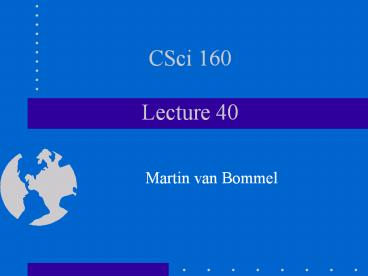CSci 160 Lecture 40 - PowerPoint PPT Presentation
Title:
CSci 160 Lecture 40
Description:
CSci 160 Lecture 40 Martin van Bommel lvalues In C, any expression that refers to an internal memory location is called an lvalue Appear on left side of assignment ... – PowerPoint PPT presentation
Number of Views:91
Avg rating:3.0/5.0
Title: CSci 160 Lecture 40
1
CSci 160Lecture 40
- Martin van Bommel
2
lvalues
- In C, any expression that refers to an internal
memory location is called an lvalue - Appear on left side of assignment statement
- e.g. x 1.0 intarray2 17
- Constants expressions are not lvalues
3
Memory and Data Representation
- Every lvalue is stored somewhere in memory and
therefore has an address - Once declared, the address of an lvalue never
changes, even though its contents may change - Depending on type of data, different lvalues
require different amounts of memory - The address of an lvalue is itself data that can
be manipulated and stored in memory
4
Pointer Declaration
- A pointer is a variable storing the address of
another variable - Declaration type ptr
- Example int p1, p2
- p1 and p2 are referred to as pointers-to-int, and
may contain the addresses of integers
5
Pointer Operations
- C defines two operators that manipulate pointer
values address-of value-pointed-to
(dereference) - Operand of must be lvalue, and returns the
address of the lvalue - Operand of must be a pointer, and returns the
value pointed to by the pointer
6
Special pointer NULL
- NULL is the value of a pointer that does not
currently point to any data - Can not dereference NULL pointer
- Exists for checking file pointers, and for
applications we will see later - infile fopen(file.txt, r)if (infile
NULL) - printf(File not open)
7
Pass by Reference
- To modify value of argument, use pointer
- void SetToZero(int ip)
- ip 0
- which makes ip a pointer to the location of
the value of the argument of the call - SetToZero(x)
8
Advantage of use of operator
- When calling a function using
- func(x)
- you know the value of the variable x will not
change, whereas calling a function using - func(x)
- is allowed to change the value of x
- Easier to predict effects of function call
9
SwapInteger function
- When sorting arrays, wanted to use
- SwapIntegers(arraylow, arrayhigh)
- Using pointers allows the following
- void SwapIntegers(int p1, int p2)
- int temp
- temp p1
- p1 p2
- p2 temp
10
Returning Multiple Results
- Convert time (minutes) to hours and minutes
- void ConvertTime(int time,
- int hours,
- int mins)
- hours time / 60
- mins time 60
11
Better to use pure functions
- int Hours(int time)
- return (time / 60)
- int Minutes(int time)
- return (time 60)
- printf(d02d\n,Hours(time),Minutes(time))































